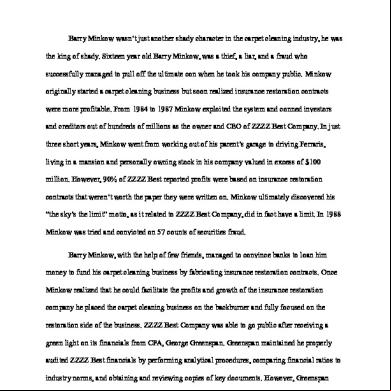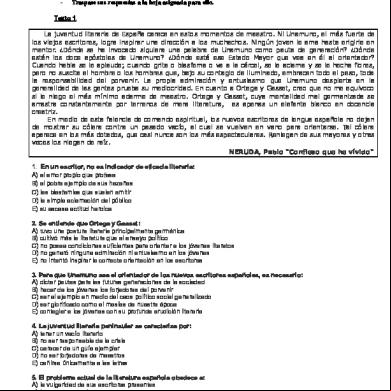Zzzz Best Company, Inc. Analysis 2l4y64
This document was ed by and they confirmed that they have the permission to share it. If you are author or own the copyright of this book, please report to us by using this report form. Report 445h4w
Overview 1s532p
& View Zzzz Best Company, Inc. Analysis as PDF for free.
More details 6h715l
- Words: 893
- Pages: 3
ZZZZ Best Company, Inc. Advanced Auditing and Forensic
ZZZZ Best Company, Inc. Analysis
Barry Minkow wasn’t just another shady character in the carpet cleaning industry, he was the king of shady. Sixteen year old Barry Minkow, was a thief, a liar, and a fraud who successfully managed to pull off the ultimate con when he took his company public. Minkow originally started a carpet cleaning business but soon realized insurance restoration contracts were more profitable. From 1984 to 1987 Minkow exploited the system and conned investors and creditors out of hundreds of millions as the owner and CEO of ZZZZ Best Company. In just three short years, Minkow went from working out of his parent’s garage to driving Ferraris, living in a mansion and personally owning stock in his company valued in excess of $100 million. However, 90% of ZZZZ Best reported profits were based on insurance restoration contracts that weren’t worth the paper they were written on. Minkow ultimately discovered his “the sky’s the limit” motto, as it related to ZZZZ Best Company, did in fact have a limit. In 1988 Minkow was tried and convicted on 57 counts of securities fraud. Barry Minkow, with the help of few friends, managed to convince banks to loan him money to fund his carpet cleaning business by fabricating insurance restoration contracts. Once Minkow realized that he could facilitate the profits and growth of the insurance restoration company he placed the carpet cleaning business on the backburner and fully focused on the restoration side of the business. ZZZZ Best Company was able to go public after receiving a green light on its financials from A, George Greenspan. Greenspan maintained he properly audited ZZZZ Best financials by performing analytical procedures, comparing financial ratios to industry norms, and obtaining and reviewing copies of key documents. However, Greenspan failed to validate the existence of the insurance restoration sites via personal inspections.
ZZZZ Best Company, Inc. Advanced Auditing and Forensic
Greenspan stated he wasn’t required to inspect the sites and was satisfied by various sources including receipt of payments. Although, receipt of payment verifies a payment was received, it does not validate the existence of the contracts. Had Greenspan conducted site visits and/or obtained sufficient and appropriate evidence to completeness of the jobs, Minkow may have never went public. Greenspan’s actions, as they related to ZZZZ Best audit, were investigated but AIA’s ruled Greenspan had not violated its Code of Professional conduct. ZZZZ Best Company, now a publically traded company, acquired a high profile law firm to represent them and one of the Big Eight ing firms, Ernst & Whinney, to bolster credibility. Ernst & Whinney engagement was to include a review, assist with registration statement, prepare a comfort letter, and full-scope audit for fiscal year ending April 30th, 1987. Ernst & Whinney resigned from ZZZZ Best Company engagement 11 months later and never completed an audit for 1987 financials. A review of financial statements as of July 31, 1986 was conducted and relied on by at least one banking institution. The bank, in question, filed suit against Ernst & Whiney but was unsuccessful. The judge, presiding over the ZZZZ Best case, ruled in favor of Ernst & Whinney, as a review not only offers limited assurance but the report specifically declined to express an opinion and repudiated rights to rely on its content. Had Ernst & Whinney conducted an audit, where they expressed an opinion giving reasonable assurance that no material errors or illegal acts were detected in the financial statements, they would have been liable for damages. However, a review was conducted, and did not require Ernst & Whinney to test controls, test records, obtain corroborating evidence, and/or make external inquiries. The firm of Ernst & Whinney was accused of overlooking at least 10 red flags when reviewing ZZZZ Best financials but maintain there was no wrong doing on their part.
ZZZZ Best Company, Inc. Advanced Auditing and Forensic
Minkow went above and beyond by spending upwards of $4 million to conceal the fraud he perpetrated at ZZZZ Best from the auditors. Nevertheless, there were at least 10 red flags that Ernst & Whinney were accused of overlooking and the confidentiality agreement request should have put them on high alert. After several request, Ernst & Whinney received permission to existence of one job site, but were prevented from making any follow up inquiries due to the agreement signed. The agreement limited the scope of the audit and prevented the auditors from making independent inquiries to obtaining additional evidence if needed. An auditor should withdraw from the engagement or at a minimum disclaim an opinion when a client imposes scope limitations that prevents the necessary auditing procedures from being performed. A Los Angeles Times article, based on the diary of one of Minkow’s victims, accused Minkow of credit card fraud and left people questioning Minkow’s integrity. In July 1987, shortly after the article was published, ZZZZ Best Company ceased to exist. ZZZZ’s assets were auctioned off for less than $65 thousand and Minkow served roughly five years of a 25 year prison sentence. Minkow’s redemption was short lived as he was convicted, 18 years later, of conspiracy to commit securities fraud and sentenced to five years in prison. Minkow’s conviction in 2011 lends some truth to the old saying “Once a fraud, always a fraud.”
ZZZZ Best Company, Inc. Analysis
Barry Minkow wasn’t just another shady character in the carpet cleaning industry, he was the king of shady. Sixteen year old Barry Minkow, was a thief, a liar, and a fraud who successfully managed to pull off the ultimate con when he took his company public. Minkow originally started a carpet cleaning business but soon realized insurance restoration contracts were more profitable. From 1984 to 1987 Minkow exploited the system and conned investors and creditors out of hundreds of millions as the owner and CEO of ZZZZ Best Company. In just three short years, Minkow went from working out of his parent’s garage to driving Ferraris, living in a mansion and personally owning stock in his company valued in excess of $100 million. However, 90% of ZZZZ Best reported profits were based on insurance restoration contracts that weren’t worth the paper they were written on. Minkow ultimately discovered his “the sky’s the limit” motto, as it related to ZZZZ Best Company, did in fact have a limit. In 1988 Minkow was tried and convicted on 57 counts of securities fraud. Barry Minkow, with the help of few friends, managed to convince banks to loan him money to fund his carpet cleaning business by fabricating insurance restoration contracts. Once Minkow realized that he could facilitate the profits and growth of the insurance restoration company he placed the carpet cleaning business on the backburner and fully focused on the restoration side of the business. ZZZZ Best Company was able to go public after receiving a green light on its financials from A, George Greenspan. Greenspan maintained he properly audited ZZZZ Best financials by performing analytical procedures, comparing financial ratios to industry norms, and obtaining and reviewing copies of key documents. However, Greenspan failed to validate the existence of the insurance restoration sites via personal inspections.
ZZZZ Best Company, Inc. Advanced Auditing and Forensic
Greenspan stated he wasn’t required to inspect the sites and was satisfied by various sources including receipt of payments. Although, receipt of payment verifies a payment was received, it does not validate the existence of the contracts. Had Greenspan conducted site visits and/or obtained sufficient and appropriate evidence to completeness of the jobs, Minkow may have never went public. Greenspan’s actions, as they related to ZZZZ Best audit, were investigated but AIA’s ruled Greenspan had not violated its Code of Professional conduct. ZZZZ Best Company, now a publically traded company, acquired a high profile law firm to represent them and one of the Big Eight ing firms, Ernst & Whinney, to bolster credibility. Ernst & Whinney engagement was to include a review, assist with registration statement, prepare a comfort letter, and full-scope audit for fiscal year ending April 30th, 1987. Ernst & Whinney resigned from ZZZZ Best Company engagement 11 months later and never completed an audit for 1987 financials. A review of financial statements as of July 31, 1986 was conducted and relied on by at least one banking institution. The bank, in question, filed suit against Ernst & Whiney but was unsuccessful. The judge, presiding over the ZZZZ Best case, ruled in favor of Ernst & Whinney, as a review not only offers limited assurance but the report specifically declined to express an opinion and repudiated rights to rely on its content. Had Ernst & Whinney conducted an audit, where they expressed an opinion giving reasonable assurance that no material errors or illegal acts were detected in the financial statements, they would have been liable for damages. However, a review was conducted, and did not require Ernst & Whinney to test controls, test records, obtain corroborating evidence, and/or make external inquiries. The firm of Ernst & Whinney was accused of overlooking at least 10 red flags when reviewing ZZZZ Best financials but maintain there was no wrong doing on their part.
ZZZZ Best Company, Inc. Advanced Auditing and Forensic
Minkow went above and beyond by spending upwards of $4 million to conceal the fraud he perpetrated at ZZZZ Best from the auditors. Nevertheless, there were at least 10 red flags that Ernst & Whinney were accused of overlooking and the confidentiality agreement request should have put them on high alert. After several request, Ernst & Whinney received permission to existence of one job site, but were prevented from making any follow up inquiries due to the agreement signed. The agreement limited the scope of the audit and prevented the auditors from making independent inquiries to obtaining additional evidence if needed. An auditor should withdraw from the engagement or at a minimum disclaim an opinion when a client imposes scope limitations that prevents the necessary auditing procedures from being performed. A Los Angeles Times article, based on the diary of one of Minkow’s victims, accused Minkow of credit card fraud and left people questioning Minkow’s integrity. In July 1987, shortly after the article was published, ZZZZ Best Company ceased to exist. ZZZZ’s assets were auctioned off for less than $65 thousand and Minkow served roughly five years of a 25 year prison sentence. Minkow’s redemption was short lived as he was convicted, 18 years later, of conspiracy to commit securities fraud and sentenced to five years in prison. Minkow’s conviction in 2011 lends some truth to the old saying “Once a fraud, always a fraud.”











